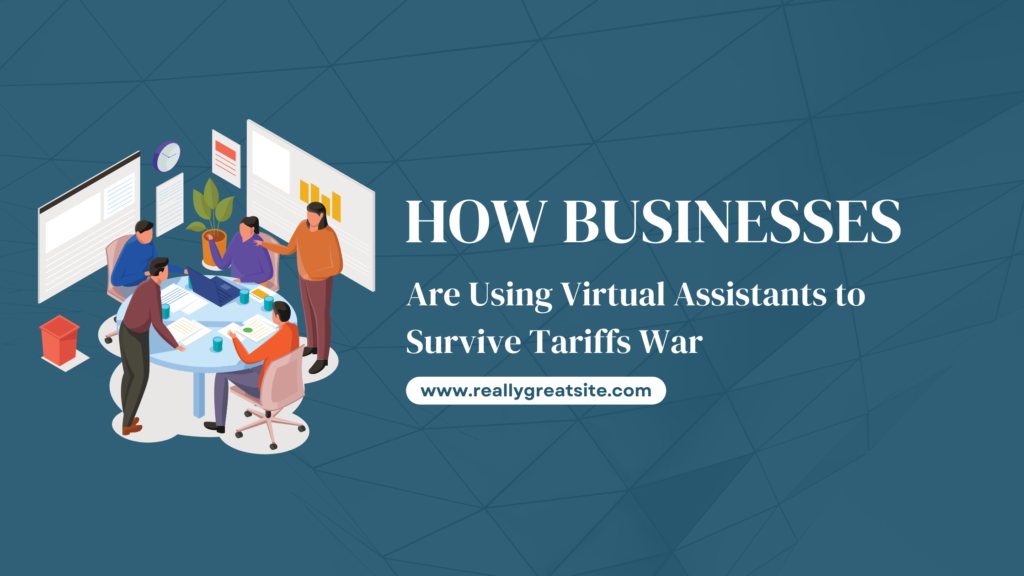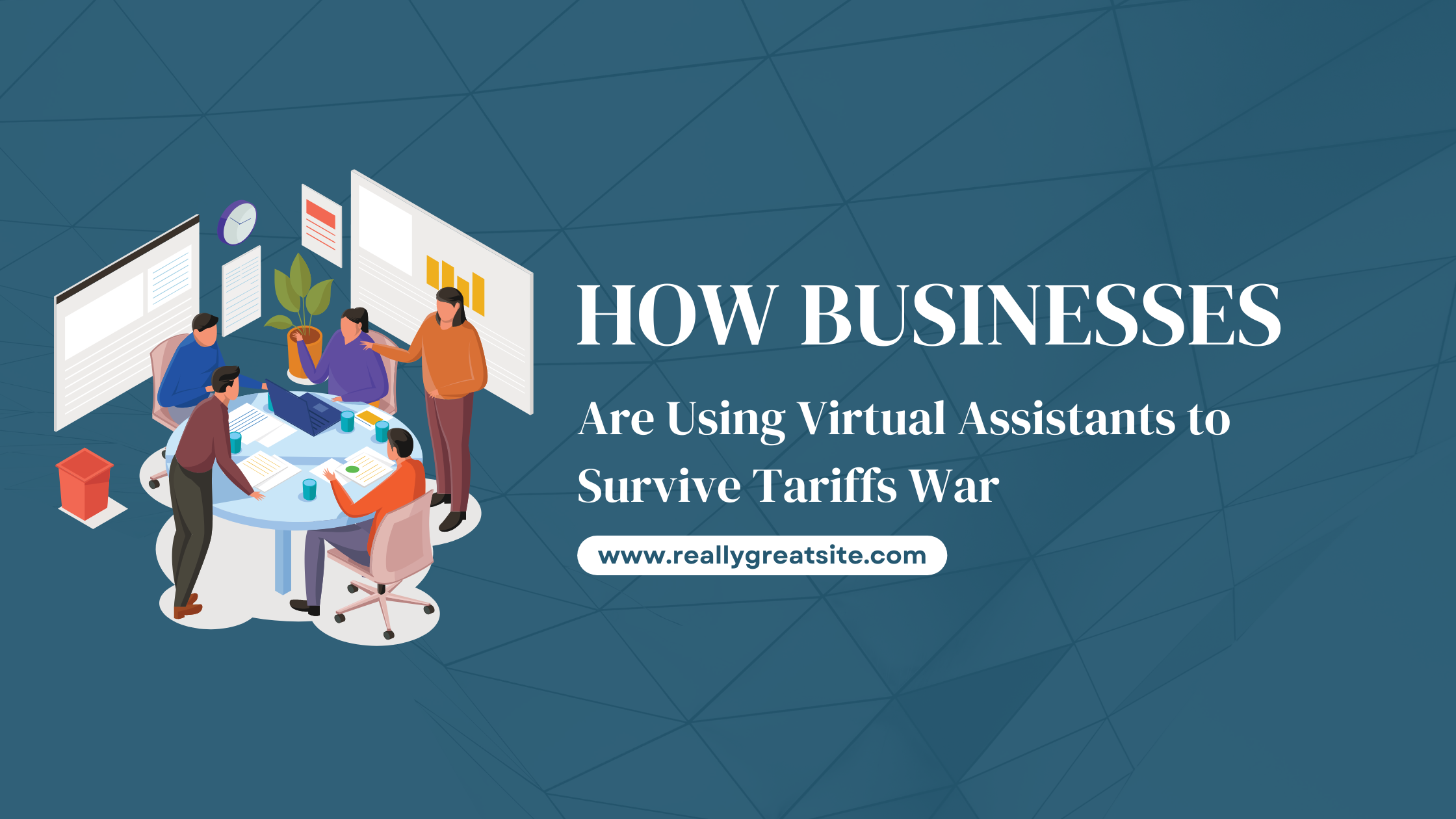
How Businesses Are Using Virtual Assistants to Survive Tariffs War
In an era defined by economic volatility, businesses are being forced to rethink everything — from supply chains to staffing. The US-China trade war and the return of aggressive Trump tariffs in 2025 are once again pushing companies to adapt or get left behind.
But amid these disruptions, some business owners have discovered a powerful workaround: virtual assistants. By outsourcing strategically to virtual assistant companies, they’re cutting costs, scaling smarter, and weathering international trade conflicts more effectively than their competitors.
The Tariff Trouble: What You Need to Know

The impact of the ongoing Trump-China tariff saga has been far-reaching. Since the original trade war escalated in 2018, the U.S. has imposed tariffs on more than $360 billion worth of Chinese goods. In return, China retaliated against Trump’s tariffs with counter-tariffs on U.S. goods, hitting American farmers, manufacturers, and retailers especially hard.
With the announcement of new tariffs in 2025, dubbed the “Trump Mexico-Canada-China Tariffs”, the strain on global trade has intensified again. The latest measures include:
-
A 60% tariff on Chinese imports (double the 30% from the 2018 round)
-
New taxes on auto parts, aluminum, and steel from Canada and Mexico
-
Tighter scrutiny on digital goods, e-commerce imports, and cross-border services
According to the Peterson Institute for International Economics, these tariffs could reduce U.S. GDP by up to 1.3% over time, depending on how other countries respond with countermeasures.
Businesses now face increased costs, slower supply chains, and reduced market access — creating a perfect storm that threatens profitability.
The Hidden Cost of In-House Staffing
Even before tariffs became a headline again, many businesses were struggling to manage ballooning overheads. Hiring in-house employees often means taking on not just salaries, but:
-
Payroll taxes
-
Office space and utilities
-
Equipment and software licensing
-
HR and legal liabilities
When global trade gets disrupted and margins tighten — like during the Trump tariffs 2025 period — every dollar saved is crucial.
According to Gallup, 43% of small businesses reported reducing internal staff during the original trade war in 2019 due to budget constraints. With supply costs now rising again, many entrepreneurs are looking for flexible, scalable staffing alternatives.
Virtual Assistants: The Agile Alternative

Virtual assistants offer a unique value proposition: skilled support without the burden of full-time employment.
Here’s why more businesses are choosing virtual assistants during the Trump-China tariff crisis:
1. Cost-Effectiveness
A virtual assistant can cost as little as $3.12/hour, compared to the U.S. minimum wage of over $7/hour (often much more in skilled roles). This allows businesses to scale support services like admin, content creation, lead generation, or bookkeeping without draining capital.
2. Flexibility
Whether it’s part-time help for 10 hours a week or a full-time assistant across time zones, outsourcing allows for true flexibility. You only pay for what you use — no benefits, no sick days.
3. Global Talent Pool
Need a Mandarin-speaking assistant to help negotiate new sourcing deals in Asia due to the US-China trade war? Or someone who understands EU compliance as tariffs hit North America? Virtual assistants allow businesses to hire globally without international office setups.
4. Resilience
Staffing disruptions due to inflation, layoffs, or economic downturns can cripple local teams. Outsourced help creates operational resilience, with remote teams working across continents.
Case Studies: Outsourcing Through a Trade War
When Trump announced tariffs against Canada, Mexico, and China, U.S.-based startup CargoTrack found its cross-border shipping costs rising by 22% overnight.
Instead of hiring more local analysts, founder Greg Nguyen outsourced logistics tracking and customs paperwork to virtual assistants in the Philippines and Eastern Europe.
“The switch saved us $4,000/month and allowed us to redirect those savings into software development,” Greg says.
2. A UK Wellness Coach Scales Across Borders
Sophie, a health and wellness coach based in London, was affected not only by Brexit, but also by the Trump tariffs 2025 that limited her American clients’ ability to access international services affordably.
By outsourcing email campaigns, webinar scheduling, and social media content to a virtual assistant, she expanded into Australia and South Africa.
“I got back 15 hours a week and tripled my revenue in six months,” Sophie reports.
Why TaskVirtual Stands Out
Among the platforms offering outsourced talent, TaskVirtual and its excellent virtual assistant services have become a top choice for entrepreneurs navigating tariff-driven uncertainty.
1. Expert Consultation
Not sure what to outsource or how? TaskVirtual offers strategic onboarding calls to help you identify the highest-impact tasks to delegate first.
2. Affordable Pricing
Plans range from just $3.12/hour to $14.99/hour, allowing businesses of all sizes to tap into high-quality support without breaking the bank.
3. Verified Excellence
With 364 verified reviews and an average rating of 4.7 stars, TaskVirtual is recognized for its reliability, communication, and quality control.
4. AI-Powered Workflow Support
TaskVirtual blends virtual assistance with AI-enhanced systems to improve your productivity and offer data-driven task optimization — a key advantage in managing tariff-related complexity.
Whether you’re a solo founder or a scaling team, TaskVirtual can provide customized VA solutions that help your business stay lean, agile, and competitive.
Looking Ahead: Preparing for More Tariff Shocks
As the Trump tariff 2025 landscape continues to evolve, with Mexico, Canada, and China all subject to shifting rates, the only certainty is uncertainty.
What can businesses do?
-
Diversify suppliers to offset regional price shocks
-
Digitize processes to reduce dependence on location-based roles
-
Outsource non-core functions to reduce overhead and build flexibility
-
Invest in virtual teams that can support growth, even when borders close or trade stalls
Outsourcing isn’t just about saving money — it’s about building a future-proof business in a world where trade policies change with every administration.
Final Thoughts
The global economy may be unpredictable, but how your business responds doesn’t have to be. While the US-China trade war and retaliatory tariffs make headlines, smart entrepreneurs are quietly adapting — not by waiting for things to return to normal, but by outsourcing strategically.
Whether you’re bracing for the effects of the Trump China tariff or seeking ways to expand internationally despite regulatory changes, a virtual assistant might be the smartest hire you make this year.
Let your competitors get stuck in paperwork and panic. You’ve got better options — and TaskVirtual can help you find them.







